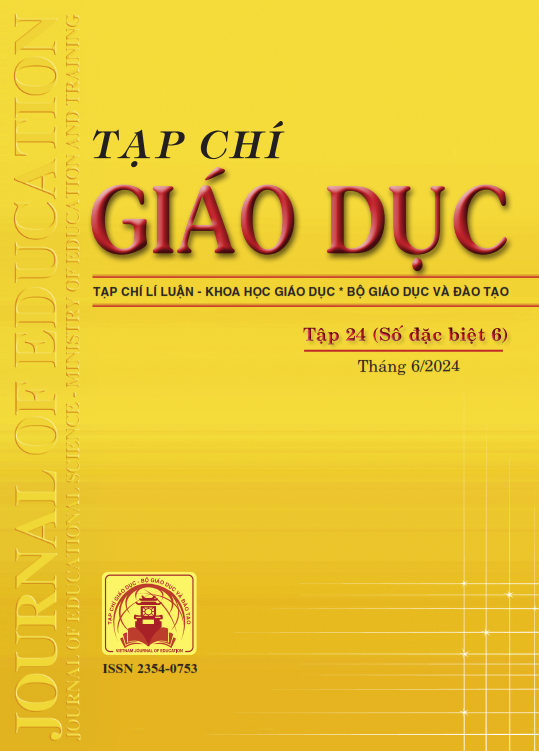Nhận thức của sinh viên sư phạm Toán về đánh giá quá trình: Một nghiên cứu trường hợp tại Trường Đại học Giáo dục - Đại học Quốc gia Hà Nội
Tóm tắt
The research was conducted to survey the awareness of mathematics education students about formative assessment, particularly in the context of reforming the general education program with an orientation towards increasing diverse forms of assessment, focusing on formative assessment. A case study was conducted with students majoring in Mathematics Education who are in their third and fourth years at the VNU University of Education. A survey tool was designed, including 30 observed variables for 6 survey aspects concerning students' perceptions of formative assessment. Data were processed from 228 responses, with the Cronbach's alpha coefficient measuring the reliability of the survey tool being 0.867. Analysis of the survey data shows that mathematics education students' understanding of formative assessment, although quite good, is not comprehensive. Students' awareness of some aspects related to formative assessment differs between those who have not yet studied and those who have or are currently studying some modules with content related to formative assessment, as well as between third-year and fourth-year students. These result predict students' understanding of formative assessment and their ability to implement it in teaching practice after graduation.
Tài liệu tham khảo
Andersson, C., & Erixon, E.-L. (2022). Formative assessment-in the hands of beginning mathematics teachers. Twelfth Congress of the European Society for Research in Mathematics Education (CERME12). https://hal.science/hal-03753397
Angelo, T. A., & Cross, K. P. (1994). Classroom Assessment Techniques: A Handbook for College Teachers (Vol. 2nd). San Francisco: Jossey-Bass.
Bennett, R. E. (2011). Formative assessment: A critical review. Assessment in Education: Principles, Policy and Practice, 18(1), 5-25. https://doi.org/10.1080/0969594X.2010.513678
Bộ GD-ĐT (2018). Chương trình giáo dục phổ thông môn Toán (ban hành kèm theo Thông tư số 32/2018/TT-BGDĐT ngày 26/12/2018 của Bộ trưởng Bộ GD-ĐT).
Black, P., & Wiliam, D. (1998). Assessment and classroom learning. International Journal of Phytoremediation, 21(1), 7-74. https://doi.org/10.1080/0969595980050102
Black, P., & Wiliam, D. (2009). Developing the theory of formative assessment. Educational Assessment, Evaluation and Accountability, 21(1), 5-31. https://doi.org/10.1007/s11092-008-9068-5
Brookhart, S. M. (2011). Educational Assessment Knowledge and Skills for Teachers. Educational Measurement Issues and Practice, 30(1), 3-12.
Brookhart, S. M., & Nitko, A. J. (2011). Educational Assessment of Students. Pearson Education.
Chappuis, J. (2014). Classroom assessment for student learning. Pearson.
Clark, I. (2012). Formative Assessment: Assessment Is for Self-regulated Learning. In Educational Psychology Review, 24(2), 205-249. https://doi.org/10.1007/s10648-011-9191-6
Keeley, P., & Tobey, C. R. (2011). Mathematics Formative Assessment: 75 Practical Strategies for linking Assessment, Instruction, and Learning (Vol. 1). Corwin, A SAGE Publications Company.
Popham, W. J. (2011). Transformative Assessment in Action_ An Inside Look at Applying the Process. Association for Supervision & Curriculum Development.
Stiggins, R., & Chappuis, J. (2006). Assessment FOR learning rather than assessment OF learning helps students succeed. Journal of Staff Development, 27(1), 10-14.
Wiliam, D. (2011). Embedded Formative Assessment. Solution Tree Press.
Wiliam, D., & Thompson, M. (2007). Integrating assessment with learning: what will it take to make it work? C. A. Dwyer (Ed.), 53-82. https://doi.org/https://doi.org/10.4324/9781315086545-3
Đã Xuất bản
Cách trích dẫn
Số
Chuyên mục
Giấy phép

Tác phẩm này được cấp phép theo Ghi nhận tác giả của Creative Commons Giấy phép quốc tế 4.0 .












